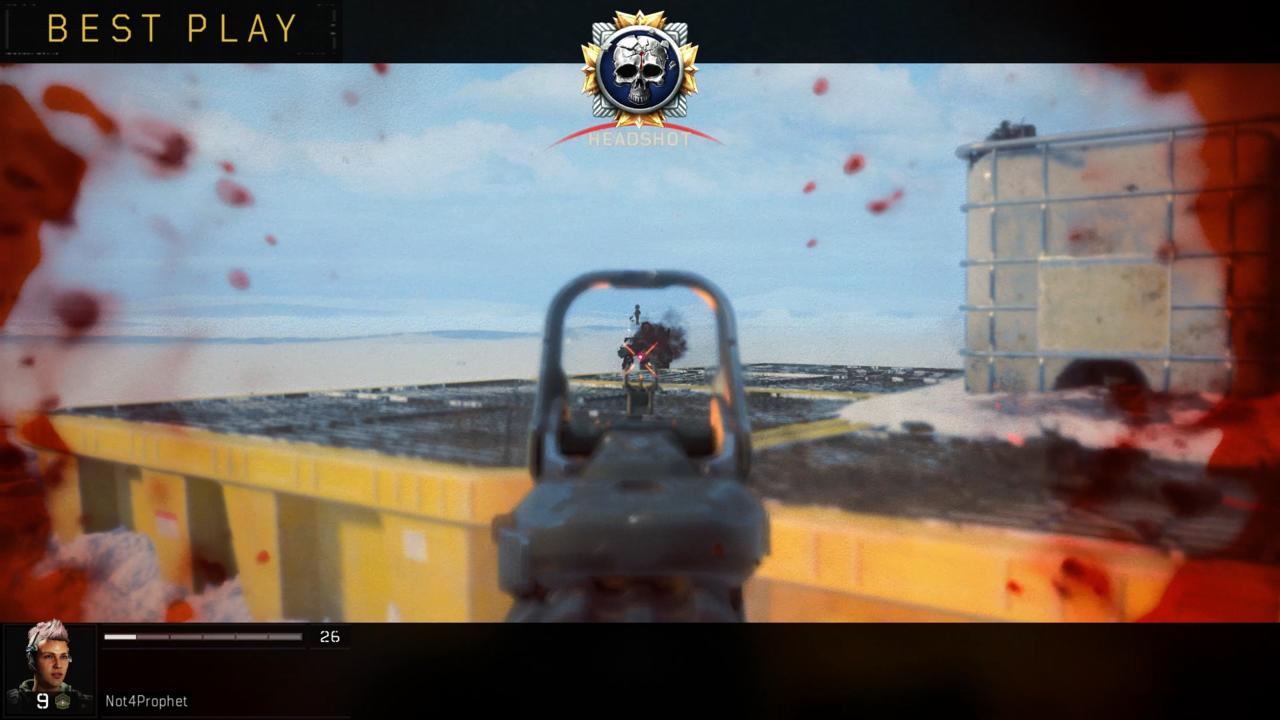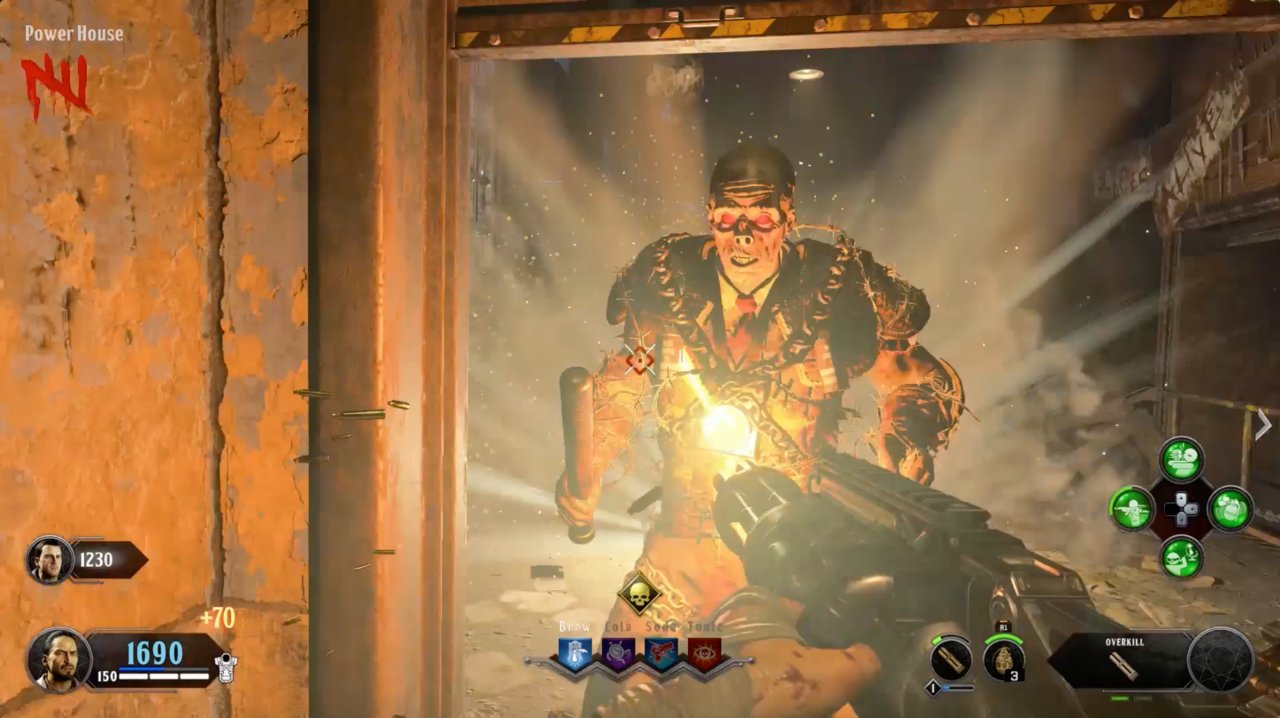Just over a week since release, developer Treyarch has rolled out numerous updates for Black Ops 4. The latest such patch introduced a variety of bug fixes and stability improvements, while multiple upcoming updates will focus on improving network performance. A Halloween event has also been announced, and Treyarch has brought back the series' Black Market feature where you can acquire new cosmetics. Read on for our full review (originally published on October 17).
As a continuation of the Black Ops subseries, Call of Duty: Black Ops 4 both benefits from and is limited by its past. All three of its major modes--multiplayer, Zombies, and the new battle royale mode Blackout--pull from and build upon previous games. Multiplayer is largely successful in its mix of old and new, while Zombies struggles more with dated elements. Blackout, though, strikes an excellent balance, putting a clever Call of Duty spin on a genre entirely new to the series.
While Black Ops 4 doesn't have a traditional single-player campaign, it does have a helpful set of character-focused tutorial missions. Called Specialist HQ, it introduces you to each of the 10 multiplayer Specialists one by one, taking you through their unique abilities and a practice multiplayer match. It does have a bit of a story and some gorgeous (and gory) cutscenes threading each mission together, but it's all in service of getting you acquainted with the new Specialist mechanics--which is well worth the three or so hours it takes, since some of those mechanics appear in Blackout as well. One mission even weaves in a bit of general Zombies training, an unexpected but welcome touch that helps make the largely separate modes feel a little more cohesive.
Multiplayer
Multiplayer is the most straightforward of the modes, and Black Ops 4 attempts to be more tactical than previous entries. The wall-running and thrust-jumping of Black Ops 3 is gone, replaced with weighty, grounded movement, and healing is now manual and on a cooldown timer. The combination forces you to be more thoughtful about your positioning, since you can't just jet and dodge enemy fire until your health regenerates--you need to make sure you have adequate cover and time to heal yourself in your immediate vicinity. This encourages a slightly slower, more cautious pace on an individual level, and it's refreshing to play it smart instead of just fast. But time-to-kill is still low and respawning still near-instant, ensuring that matches don't stagnate.
The more tactical feel extends to the Specialists, which build upon those introduced in Black Ops 3. Each has a unique weapon and equipment with a specific combat focus, like area control or high damage output. Each Specialist's weapon is tied to a longer cooldown and functions as a superpowered attack (or defensive ability, in some cases), while their equipment varies from a special grenade to trip mines and other gear with a clear strategic purpose. This includes roles other than offensive ones--there's even a pseudo-healer Specialist, Crash--and it's a change that gives multiplayer more variety.
Certain Specialists and strategies are more useful in some game types than others, though. Area control is best for objective-based modes like Domination, for example, and far less effective in the more scattered Team Deathmatch. Generally, your choice of Specialist and your team's composition won't matter in any mode if you aren't skilled in basic shooting and positioning, even if you're in a more defensive or supporting role. This means you can play selfishly and still emerge victorious, which works well for those of us who often solo queue and would rather not risk trying to communicate with randoms. But it can also make playing support-focused Specialists less rewarding if you aren't working as a team, since your efforts are useless if your teammates don't take advantage of them. It's a surprisingly good balance overall, though, giving you the flexibility to be only as tactical as you want or are able to be and enjoy the match regardless.
The map design, too, facilitates that flexibility. Each map has areas perfect for different Specialists to take advantage of, like blind corners where Nomad's trip mines can take enemies by surprise or high ceilings where Recon can shoot and hide his Sensor Dart that reveals enemies on your radar. But the long and narrow three-lane structure each map is built on is a strong foundation for more traditional shooting as well, with both long sightlines good for sniper and tactical rifles and tight spaces for close-range automatic weapons.

The Specialist strategies are best showcased in the new Control, an objective-based mode in which each team, one attacking and one defending, shares 25 lives. You win by either exhausting all of the enemy team's lives or gaining or maintaining control of the two objectives. A defensive Specialist like Torque, who has Razor Wire perfect for placement under windows and a Barricade "weapon" for extra cover, is a great option if you're trying to hold an objective, for example. An offensive Specialist, on the other hand, can aim to wipe out the enemy team.
Zombies
Black Ops 4's Zombies is as broad as it is deep, with two separate storylines across three maps (or four if you have the Black Ops pass included in the game's special editions). The first two, IX and Voyage of Despair, are part of the brand-new Chaos story, while Blood of the Dead and Classified round out the selection of maps to make up the returning Aether story. All of them follow the familiar Zombies formula--fighting waves of the undead, saving money to access better weapons and new areas, and uncovering wacky secrets and puzzles along the way--but each has its own quirks that take time and effort to discover.
The Chaos maps are strong aesthetically, with rich level design and clever puzzles to match--draining water that has seeped into the Titanic's depths so you don't drown while searching for other secrets, for example. Like previous Zombies maps, a lot of the fun comes from figuring out how the map ticks while also trying not to die, and both IX and Voyage of Despair have the complex layouts that lend themselves to thorough yet hectic exploration. Voyage is a personal favorite, with narrow, creepy hallways and presumably drowned zombies that have water gushing from their heads.

On the Aether side, Blood of the Dead is based on Black Ops 2's Mob of the Dead, while Classified is a reimagination of Black Ops' Five. Although they're definitely familiar, there are still surprises to entertain returning players--some puzzles don't unlock what you expect them to unlock, for example. However, the Ultimus crew hasn't aged particularly well, even considering that each of them is stereotyped to the extreme. The jokes just don't land anymore, especially Takeo's overdone Japanese accent where Ls are replaced with Rs at every opportunity. In Blood of the Dead it's distracting, but in Classified, lines about the Emperor and eating sushi are just plain offensive. You'll also hear these same lines every time you start a new run, which doesn't help.
On top of the already hefty amount of Zombies content, Black Ops 4 introduces a new mode of fighting the undead, Rush. It's a much faster-paced version of Zombies where you don't have to do any thinking or puzzle-solving; you're just there to kill them horde-style. There's no money, so you don't need to save up to buy a weapon or unlock a door. You're instead told which area will have the next Rush wave, and you're directed from room to room as you go. It's too intense to be a tutorial, per se, but it's a great way to familiarize yourself with the map, test weapons, and plan where to go next if you get stuck in Classic mode.
Blackout
The third and most exciting of Black Ops 4's three main sections is, of course, Blackout. Like other battle royale games, Call of Duty's take puts 100 players on one map with the goal of being the last person or squad standing, and a collapsing circle of death forces you in closer and closer proximity. It's unlike anything Call of Duty has done before, and slight alterations to its mechanics, like the addition of bullet drop on some weapons, help it adapt to the very different gameplay style.
Brilliantly, experience in both multiplayer and Zombies benefits you in Blackout. Perks and Specialist equipment can be looted during a match, and knowing how to both use and counter them can give you an advantage. There are also zombie-infested areas that offer powerful loot at the risk of attracting human players to your position, and that PvE twist in particular helps distinguish Blackout from the likes of PUBG. A successful Blackout round can last over 20 minutes, so if you're impatient or more used to Call of Duty's shorter multiplayer formats, seeking out zombies and causing a ruckus mid-match is a great way to see more action.

The map itself is also distinctly Call of Duty, filled with references to previous games, including the fan favorite Nuketown. Vibrant and varied design makes each region stand out from the next, and the map as a whole is easy to navigate as a result. That in turn facilitates the strategic movement and positioning necessary to succeed; it's easy to pivot if a lot of other people are nearby, for example, if you know where you are in relation to the next-best loot area.
The combination of Call of Duty-specific mechanics with PUBG-style health, loot, and shooting systems is executed well, with quality-of-life improvements to UI--notably, you can quick-equip weapon attachments without going into your menu. The twists are balanced, too, and the Specialist equipment in particular doesn't make things feel unfair. Like in multiplayer, you can ignore anything you don't want to bother with, and survival ultimately comes down to your situational awareness, your skill with various weapons, and a bit of luck with looting and the circle. That makes victory feel earned and, as a result, immensely gratifying--Blackout definitely captures the tense, shaky excitement that makes battle royale such a popular genre.
Black Ops 4 isn't short on content, and its three main modes are substantial. Multiplayer introduces more tactical mechanics without forcing you into them, and it largely strikes a good balance. Zombies has multiple deep, secret-filled maps to explore, though its returning characters don't hold up and prove distracting. Finally, Blackout pushes Call of Duty in an entirely new direction, making use of aspects from both multiplayer and Zombies for a take on the battle royale genre that stands on its own. Sure, there isn't a traditional single-player campaign, but with the depth and breadth of what is there, Black Ops 4 doesn't need it.



























